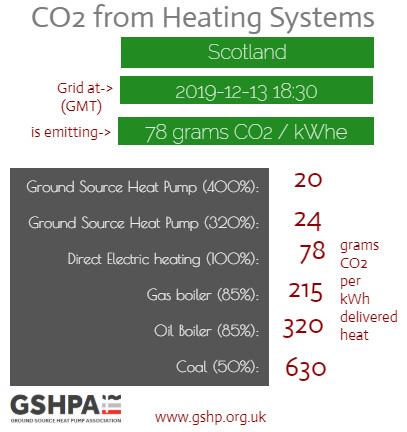Boiler Upgrade Scheme replaces the RHI from April 2022
GSHPA welcomes the replacement of the Domestic RHI with the Boiler Upgrade Scheme grant. A grant is a better way to support owners who face up-front costs on moving to clean heating systems – and a single payment is administratively much simpler (and very much cheaper) than 28 payments spread over seven years.
However, a grant of only £5,000 for an ASHP (or £6,000 for a GSHP) is too low to encourage homeowners to move to clean heating. The government needs to acknowledge that a homeowner who considers a clean heating mechanism is facing a private cost to provide a public benefit.
The Boiler Upgrade Scheme is only proposed to last for three years and funding is limited to £450m. This lack of clarity and lack of ambition will provide no certainty for installers proposing to serve the market.
The limited level of the grant will point households to the cheapest technologies. A £5,000 grant is not enough to encourage investment in a £9,000 air source heat pump system for a small house.
£6,000 will only amount to a small contribution towards a £16,000 investment in a ground source heat pump system. The Government should be encouraging investment in ground source systems because they are inherently more efficient and because a key part of the investment is in a ground array that will last for over 100 years. The national interest is to encourage investment in long term solutions. Investment in ground source will create green jobs in the UK, but investment in air source will encourage spending on air source heat pumps which are largely imported.
A grant of £5,000 focusses the grant on small houses (whose owners may not be able to afford any investment in low carbon energy). If the Government is serious about achieving a significant reduction on emissions from houses, it should be focussing on larger houses which issue larger emissions of CO2.
Investment in low carbon technologies, like heat pumps, is a private investment for a public benefit. Until the Treasury acknowledges that public money is needed to encourage the public benefit of lower carbon emissions very few heat pumps will be installed, the skills shortage will remain and the supply chain will be underdeveloped. There will be very few green jobs created in the UK by the current proposal.
The Climate Change Committee has recommended that, "The 29 million existing homes across the UK must be made low-carbon, low-energy and resilient to a changing climate. This is a UK infrastructure priority and should be supported by HM Treasury. Homes should use low-carbon sources of heating such as heat pumps and heat networks".
Financial barriers to installing clean heat
The Boiler Upgrade Scheme grant, although small, will reduce the up-front cost of installing clean heating. The government has also reduced the rate of VAT to 0% for installation of heat pumps. However, the Treasury still levies an illogical 25% "environmental charge" on the electricity needed to run a heat pump, but only 2.4% on the gas used by a gas boiler. The government needs to address this if it is to achieve its stated ambition of seeing 600,000 heat pump installations a year by 2028.
Government needs to respond to the widespread calls to curb climate change
All UK political parties express concern about climate change, but seem vague about what should be done to curb it.
The Climate Change Committee has been very clear that, "The 29 million existing homes across the UK must be made low-carbon, low-energy and resilient to a changing climate. This is a UK infrastructure priority and should be supported by HM Treasury. Homes should use low-carbon sources of heating such as heat pumps and heat networks"
Real progress has been made in decarbonising electricity
Real progress has been made in decarbonising electricity generation: this has been achieved largely by curbing electric generation from the combustion of coal and encouraging generation from wind turbines.
No progress has been made in decarbonising heating
Almost no progress has been made in decarbonising heating: almost 84% of homes are still heated by combustion of gas supplied through the national gas grid.
The asperations expressed in the Government's Ten Point Plan need to be translated into practical measures – or the Boiler Upgrade Scheme will be no more effective in moving the UK towards Net Zero than the Green Homes Grant or the "Renewable Heat Incentive".
As CO2 is emitted from combustion of all carbon compounds, the answer to curbing climate change lies in using heating systems which do not use combustion. The alternative is heat transfer which means using heat pumps to transfer heat from the ground – or from the air – to heat buildings. This is the only practical route to achieving the Clean Growth Strategy.
It is also the only practical route to achieving the Clean Air Strategy in cities like London.
See Boiler Upgrade Scheme leaflet from BEIS.
See Renewable Heating See Renewable Cooling


